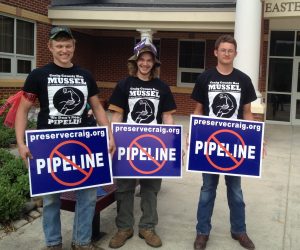Front Porch Blog

The James River Spinymussel crew of Craig County outside the first of two public hearings on the proposed Mountain Valley Pipeline. Siltation from tree clearing and pipeline construction could further threaten the endangered species. Click to enlarge.
Turnout was tremendous at the first of two hearings this week in Virginia, where federal energy regulators are taking public comments on the proposed Mountain Valley Pipeline.
Residents of Giles, Craig, Montgomery, Roanoke and Franklin counties and nearby areas told their stories and highlighted their environmental concerns on Tuesday night in Elliston in an effort to make sure the impact study process on the project is thorough.
Most commenters shared common themes: that the companies proposing the Mountain Valley Pipeline would not be able to carry out their vision for the 330-mile natural gas pipeline without egregiously damaging the area’s ecological treasures, and that the project is not in local residents’ interest and should not be allowed to proceed.
Citizens voiced a wide range of environmental concerns, many of which relate to issues unaffected by the potential rerouting of the pipeline. Among the risks that can only be prevented in a no-build scenario include:
- Creek and river siltation from the tree clearing and installation process that threatens populations of James River spinymussel in Craig County. This species was also hard-hit by the Dan River coal ash spill in 2014. A precedent exists for protecting these areas from development based on the potential negative outcome for threatened creatures; in the ‘90s a high-voltage transmission project was undone in part due to the anticipated adverse impact on freshwater mussels.
- Unique caves in the area, including Pig Hole Cave and Tawney’s Cave, have been used for years by cave diving explorers for recreation and have provided research opportunities for Virginia Tech students. While building is not normally allowed over their mapped passages, the proposed pipeline route lies directly over Pig Hole Cave and would make it inaccessible during construction and possibly permanently unsafe. New species of cave-adapted arthropods and other rare specialized lifeforms have only recently been found to exist there.
- Numerous area homeowners also spoke about the proximity of their homes to the “centerline” or middle of the up-to-40-yard-wide swath proposed for each of the various possible alternative pipeline routes. Homes, wells, gardens, trees and creeks are all in the path of proposed routes. In the event of a pipeline rupture, if the combustible gas the pipeline would carry were to ignite or explode, some neighborhoods would have no road outlet. Local leaders spoke about those fears, adding that the increase in housing in Montgomery County in the past 20 years makes it difficult to avoid these kind of direct impacts by rerouting.
Several speakers described the sense of looming danger generated by the pipeline proposal, and articulated their feelings about the project in memorable ways: as a tentacle of a symbolic Kraken representing the fossil fuel industry seeking greater profits at the expense of communities; as a wrong-headed distraction from the right of residents’ to their own property; and as a destructive force that perpetuates the exploitation of Appalachian counties threatening what is among the nation’s most valued, biodiverse and scenic environments
The Federal Energy Regulatory Commission has only scheduled hearings for Virginia in Elliston and Chatham this week. Organizers and local leaders are currently petitioning for an extended comment period beyond the current deadline of June 16.
Click here to submit your comment about the Mountain Valley Pipeline to federal regulators.
UPDATE: FERC will also hold public hearings in Weston, W.Va., on May 12 and Summersville, W.Va., on May 13. Learn more here.
PREVIOUS
NEXT
Related News

Leave a comment
Your email address will not be published. Required fields are marked *

Leave a Comment